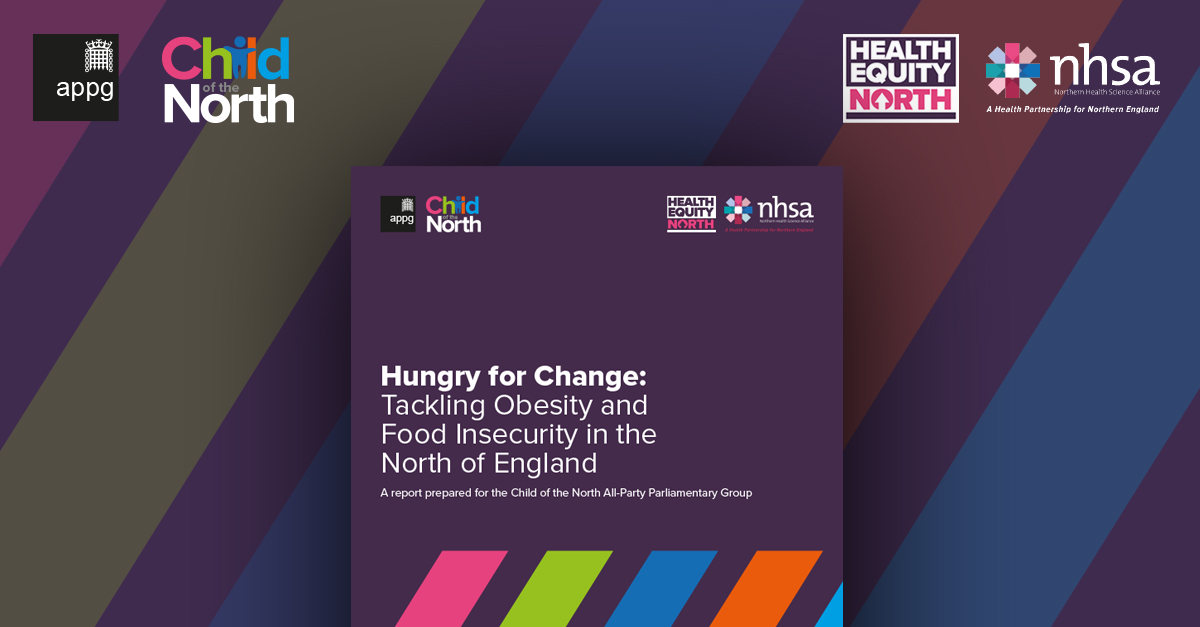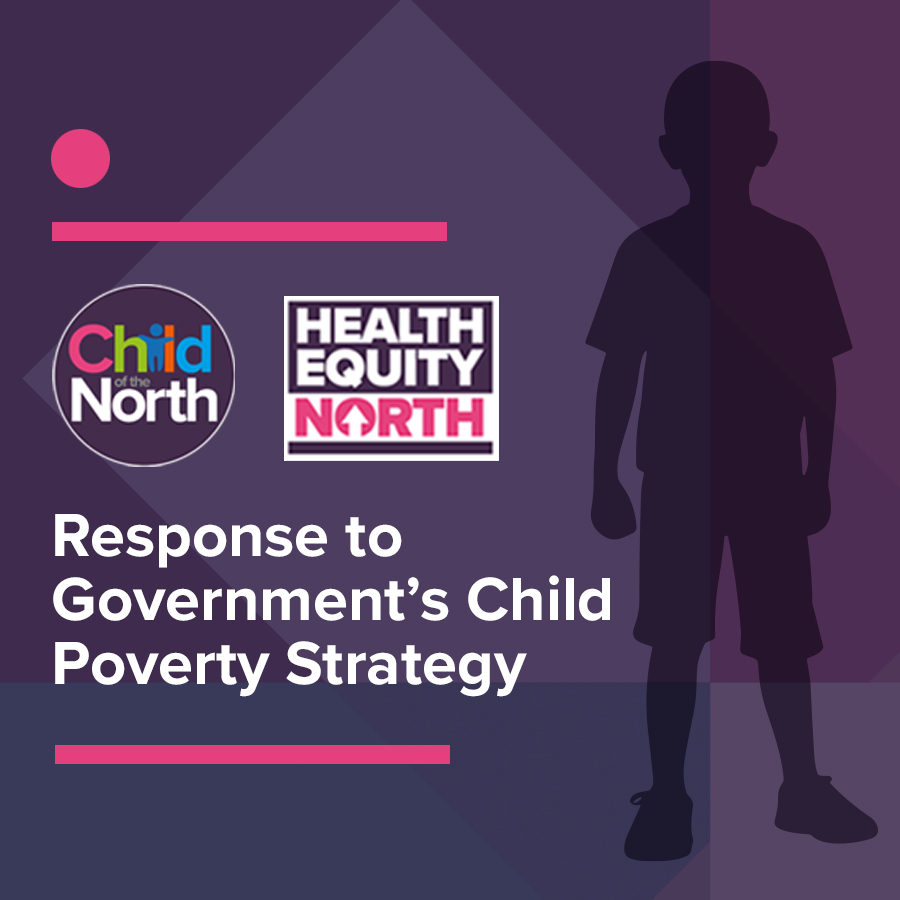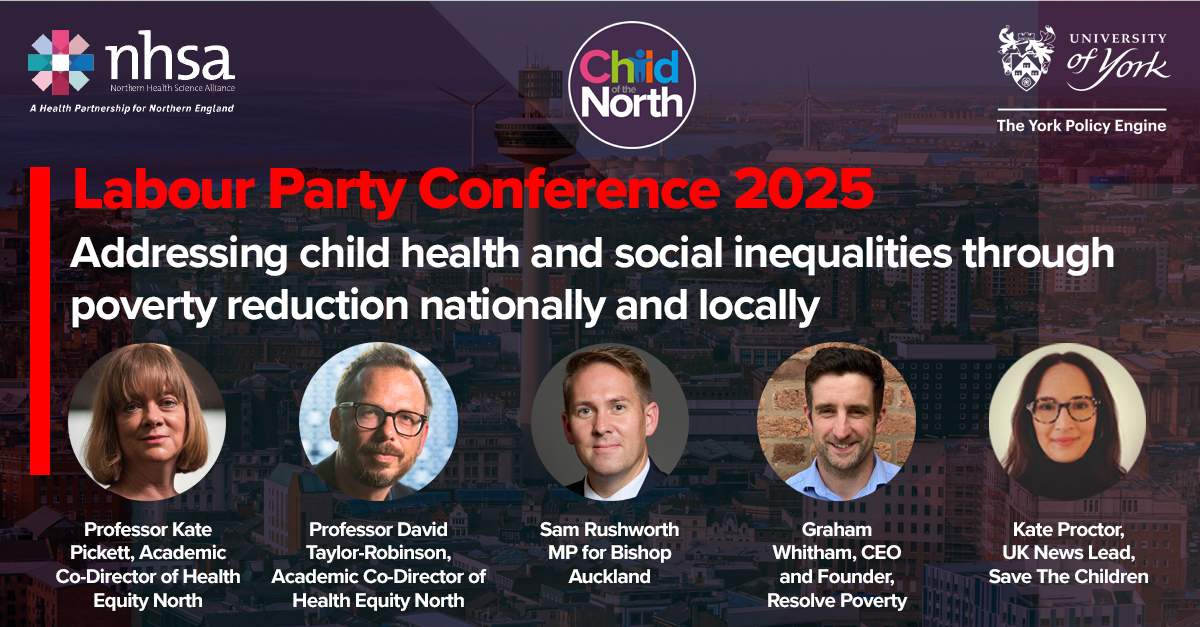Northern children facing increasing food insecurity and obesity

Read the report here
Families living in areas of higher poverty – such as the North of England – are less likely to have access to healthy, affordable food and more likely to have children who live with obesity.
A report, published today [Tuesday, July 8, 2025] by Health Equity North on behalf of the Child of the North All-Party Parliamentary Group (APPG), has revealed that food insecurity is rising across the country. This trend is being felt particularly hard in the North of England, which has seen a rise of 5.5% between 2019/20 and 2022/23, compared to 3.8% in the South.
It also shows a stark North-South divide in the prevalence of childhood obesity, which is evident as early as Reception age.
The report – ‘Hungry for Change: Tackling Obesity and Food Insecurity in the North of England’ – examines regional inequalities in childhood food insecurity and obesity and reflects on the challenges and opportunities that shape children’s health across the life course – from conception through to early adulthood.
Analysis highlighted in the report demonstrates that food insecurity is strongly linked to poverty, and families with children are twice as likely to be food insecure than those without children. Poverty is also a root cause of other major social problems such as obesity in childhood.
There are clear regional differences between the prevalence of childhood obesity at Reception age. This pattern is mirrored for Year 6 aged children, with childhood obesity prevalence in the North East at 24.5% compared with 19.1% in the South West.
The APPG members and report authors are now urging policymakers to adopt a range of measures to address this issue, including strengthening social welfare support, expanding access to nutritious food, introducing universal free school meals, and restricting fast food outlets in high-risk areas.
Further analysis in the report shows:
- Food insecurity in households with children in the North rose 5.5% between 2019/20 and 2022/23, compared to 3.8% in the South
- Childhood obesity at reception age is higher than the England average (9.6%) in all three northern regions: 10.8% in the North East, 10.7% in Yorkshire and the Humber, and 10.1% in the North West. The highest is the West Midlands at 10.9%, and the lowest is 8.4% in the East of England
- Similarly at Year 6, prevalence of childhood obesity is also higher than the England average (22.1%) in the North: 24.5% in the North East, 23.3% in the North West and 23.6% in Yorkshire and the Humber – compared to the lowest prevalence in the South West at 19.1%
- The prevalence of obesity at reception age in England is more than twice as high in the most deprived areas (12.9%) as it is in the least deprived (6%), with severe obesity at 4.1% in the most deprived areas compared to 1.1% in the least
- The North-South divide in obesity at reception age is further evident at local authority level, with the highest prevalence in Hartlepool (13.9%) compared to the lowest in Wokingham (5.7%)
- Rates of children registered for means-tested free school meals are consistently higher in the North than the England average (25.7%) – with 32.3% in the North East, 28.9% in the North West and 27.8% in Yorkshire and the Humber. The lowest rates are 20.6% in the South East
- Communities in the North are more exposed to fast food outlets, with 69.9% of people living within 1 km of their nearest fast food outlet, with each individual an average of 676m away. This figure was 7.4% higher than in the South of England (62.5%), however this difference rises to 15.7% higher when London is excluded
- There has also been a sharp increase in the number of people in the North living within 1km of their nearest fast food outlet. This figure rose by 84% between 2016 and 2024 in the North, and more than doubled in the North East, compared to the South which saw a 60% increase.
The report features first-hand experience from Newcastle-based Food Foundation Ambassador Penny Walters, who volunteers with community organisations which provide food, budgeting and cooking advice, and a sense of community. She believes that these organisations have become “a vital safety net for families like mine”, but that more must be done to provide desperately-needed support and dignity for struggling households.
She said: “Food insecurity has been a persistent reality for my family, shaped largely by inadequate welfare policies and the rising cost of living. Over the years, the support we’ve received simply hasn’t kept pace with inflation. Benefits have been cut or frozen, while food prices, rent, fuel, and basic household items have continued to rise sharply. As a result, accessing healthy and nutritious food has become increasingly difficult.
“Cooking from scratch is often presented as a solution, but it requires more than ingredients – it requires fuel, appropriate kitchen equipment, and knowledge. When even one of those elements is missing, families are left without real options.”
Penny has called for policymakers to “step outside of Westminster and engage with communities living this reality”. She urges the government to deliver policies which offer “affordability, access, and dignity”, including scrapping the two-child benefit cap, auto-enrolling families for free school meals, and providing more well-funded community hubs for advice and support.
The report includes a list of recommendations for the government with a focus on equitable approaches that target those in areas of greatest need, such as children living in deprived areas such as the North of England.
Examples include addressing the “postcode lottery” of free school meal distribution across the country by centralising auto-enrolment of free school meals so that all areas, schools and children can benefit.
Other recommendations include: prioritising policies which address poverty; reversing cuts to welfare benefits, such as the two-child limit and the reduced benefit cap; expanding access to affordable, healthy food in low-income communities through targeted subsidies, local planning measures and community food programmes; restricting the expansion of fast food outlets in high-risk areas; strengthening the Healthy Start scheme; reinvesting in early years services such as Sure Start children’s centres; and appointing a minister to coordinate policy around early years food and health.
The Child of the North APPG brings together policymakers and experts from across the country to address and suggest solutions to key issues facing children in England today. Child of the North is a partnership between Health Equity North and N8 Research Partnership. For this report, Health Equity North convened a team of academics from across the North to undertake the analysis including representatives from the University of York, the University of Liverpool, Teesside University, and Newcastle University.
Emma Lewell MP, chair of the Child of the North All-Party Parliamentary Group, said: “Every child should be able to have a healthy life, with access to good, nutritious food choices. However, far too many families in the North are confronted with hard choices every day due to poverty and increasing costs. This is affecting our children’s health at a crucial time for their development, and often leads to other issues such as obesity.
“We have an opportunity to make a difference for these families. But we can only do so if we take decisive action to address the root causes, and provide a well-supported safety net for those who are struggling.”
Professor Maria Bryant, lead author of the report who is Professor of Public Health Nutrition at the University of York, said: “Families across the country are telling us in no uncertain terms that they urgently need support. This is particularly true in the North, where poverty is rising – and with it, childhood and maternal obesity and other concerns. Addressing these issues should be a nationwide priority.
“There are measures we can take which can have a huge impact, including extending the provision of universal free school meals. However, this report makes it very clear that we must address a range of challenges from conception to adulthood to truly tackle the issue head-on.
“For example, we also need to explore how to expand access to nutritious food nationwide, offer adequate social welfare support, and strengthen the help that families receive so that they feel supported, rather than judged.”
Professor David Taylor Robinson, Health Equity North Academic Co-Director and Professor of Public Health and Policy at the University of Liverpool, said: “Childhood obesity is a major public health issue, with far reaching physical and mental consequences. While obesity is influenced by many factors, poverty remains one of the most significant, and most easily modifiable risk factors, especially in children.
“There is now a clear North-South divide when it comes to obesity. The prevalence of childhood obesity is 24.5% in the North East compared to 19.1% in the South West. Severe obesity is also four times more common in the most deprived areas than it is in the least.
“To have any chance of addressing obesity in children and – ultimately – adults, we need to tackle child poverty, particularly in areas such as the North.”
Hannah Davies, Executive Director of Health Equity North, said: “For too long, families in the North have talked about the heartbreaking decisions they must make due to rising poverty, from making do with less to skipping meals entirely. The work of partnerships such as Child of the North is to shout loudly and unrelentingly about these issues, so that they are not forgotten when decision-makers gather to agree policies for the country.
“This report demonstrates that there is still so much more to be done. The crushing poverty which is felt unequally in the North has a direct impact on other childhood issues such as obesity, which in turn has worrying impacts in adulthood. Instead of shaming and blaming families, it is time we commit as a country to actively help them.
“We need to urgently reframe our approach, by implementing a range of issues that are designed to offer families support with dignity. This includes ensuring that they have access to welfare benefits and support that are fit for purpose, as well as the community help, advice and initiatives that give them a real opportunity to live better, healthier lives.”






